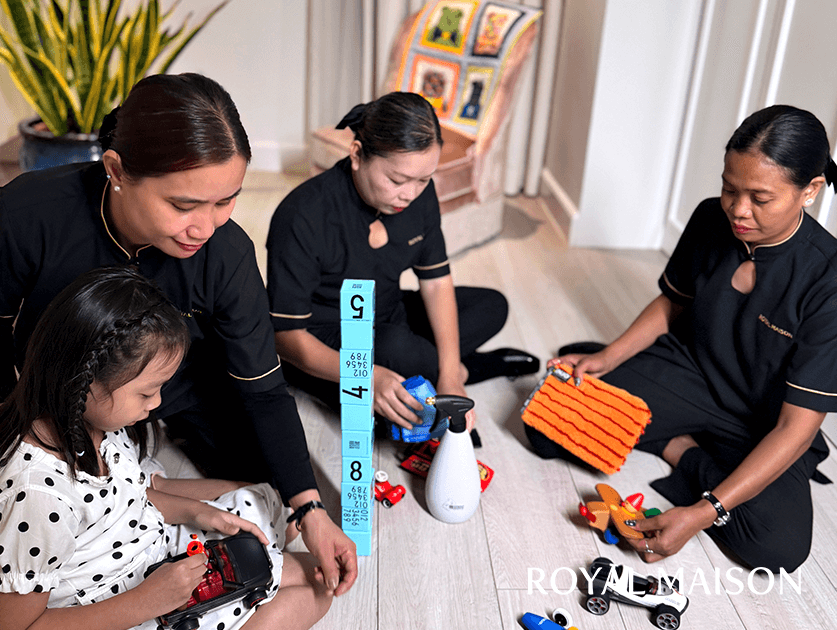
The difference between a live-in and a live out nanny lies in whether the nanny lives with you and your family or not. A live-in nanny resides with your family and is available throughout the day, while a live out nanny comes to your home daily and works according to pre-agreed hours. Both models have their advantages and potential challenges, which is why it’s important to carefully assess which option best suits your needs, lifestyle, and budget.
In a dynamic environment like Dubai, it is crucial to find a solution that not only supports your children’s development but also fits seamlessly into your family routine. In this blog, we will present all the advantages and disadvantages of both models, compare costs, privacy, and working hours, so you can make an informed decision. Finally, you will also learn how Royal Maison can help you find the right nanny for your family.
If you are in the process of finding the ideal nanny in the UAE, contact Royal Maison Domestic Agency and quickly and easily choose the nanny that suits you!
What does live-in and live out nanny mean?
When choosing between a live-in and a live out nanny, you first need to understand how these two options affect your daily life. The main difference lies in accommodation and availability: a live-in nanny lives with the family and is available throughout the day, while a live-out nanny comes to work at pre-agreed hours and goes home after their shift. This also impacts privacy, flexibility, and the organization of family life, so it’s important to choose the model that best suits your routine and budget.
Live in nanny
A live-in nanny is someone who lives in the home of the family they work for. This means they are available almost around the clock, making this option ideal for families with demanding schedules, young children, or frequent travel. However, having a nanny reside in your home can mean less privacy for the family and the need to adjust your living space.
Live out nanny
A live out nanny is a nanny who comes to your home daily but does not live with the family. She works in pre-agreed shifts, usually during the day, and goes home at the end of her working hours. This model provides the family with greater privacy and clearer boundaries between work and personal life, but it may be less flexible in urgent situations when you need help outside the agreed schedule.
Advantages and disadvantages – Table
To make the decision between a live-in and a live out nanny easier, we have prepared a clear table showing the main advantages and disadvantages of both models across key criteria. The table helps parents quickly see the differences in privacy, availability, costs, working hours, and impact on family life.
Criterion | Live-in nanny | Live out nanny |
Privacy | Less privacy since the nanny resides in the home. | Greater privacy, as the nanny only comes during working hours. |
Availability | Available almost 24/7, ideal for emergencies. | Available only during agreed hours, less flexible. |
Costs | Higher overall costs due to accommodation and benefits. | Lower costs since there is no accommodation expense; salary is proportional to working hours. |
Working hours | Longer working hours, sometimes day and night. | Fixed working hours; clear boundary between work and personal life. |
Impact on the Family | Constant presence can be intensive, but it provides continuous support. | Less presence, more time for the family’s private life. |
Flexibility | Greater flexibility in schedule and additional tasks. | Limited flexibility, depends on the agreed hours. |
Depending on your preferences and needs, this table will help you choose between a live-in and a live out nanny.
Costs and overall budget
Cost is a key factor when choosing between a live-in and a live out nanny. Expenses vary depending on the model, number of working hours, accommodation, visa and agency fees, as well as benefits and taxes.
For a live out nanny, costs are usually lower than for a live-in nanny since there is no need for accommodation or additional benefits related to living in the home. The salary depends on the number of working hours and experience. Agency fees and visa costs are smaller or sometimes do not apply, making this option more affordable for families who want quality help while maintaining clear boundaries between work and personal life.
When planning your budget, it is important to account for additional costs such as transportation, benefits, and any overtime, so that hiring a nanny remains sustainable and meets the family’s needs in the long term.
Visas, Legal, and Work Requirements in Dubai
In Dubai, hiring a nanny involves certain legal and administrative obligations. Every nanny must have a valid work visa, with the sponsoring party usually being the family that employs her. Contracts are defined clearly and in detail, including salary, working hours, benefits, and termination conditions. Health checks are mandatory, and working conditions must comply with the laws of the United Arab Emirates.
For a live out nanny, there are several additional factors that families need to consider: daily transportation to and from work, clearly defined working hours, and any additional contract clauses that regulate emergencies or overtime. These details help ensure that the boundaries between personal and professional life remain clear.

Royal Maison Domestic Agency takes care of all administrative and legal obligations for its clients. This includes handling visas, preparing contracts, organizing health checks, verifying working conditions, and ensuring full compliance with the law. This way, families can be confident that every nanny, whether live-in or live out, is employed legally, professionally, and without stress for the parents.
How Royal Maison Helps: Services, Verification, and Support
Royal Maison offers families in Dubai complete support when hiring a nanny, whether it is a live-in or live out nanny. The agency guides clients through the entire selection process, from choosing candidates according to the family’s needs to conducting detailed interviews and background checks, including professional references and previous work experience.

One of the key advantages of Royal Maison’s service is the possibility of a trial period, during which families can assess how the nanny fits into their home and adjust contract details before making a final decision. In addition, the agency provides 24/7 support, allowing parents to receive advice or assistance at any time in case of emergencies.
In this way, Royal Maison not only simplifies the administrative and legal aspects of hiring but also provides families with security and peace of mind, ensuring that every nanny, whether live-in or live out, is professional, reliable, and fully aligned with the household’s needs.
Conclusion
The choice between a live-in and a live-out nanny depends on your family’s needs, schedule, and priorities regarding privacy and flexibility. A live-in nanny provides constant availability, while a live out nanny offers more privacy and lower costs.
Royal Maison simplifies the entire hiring process, including selection, background checks, trial periods, and 24/7 support. This way, families can be confident that they will find a reliable and professional nanny who meets their needs.
